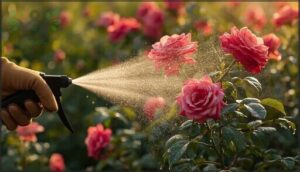This site is supported by our readers. We may earn a commission, at no cost to you, if you purchase through links.
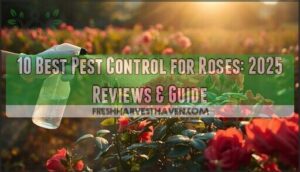
The good news is that modern pest control solutions have evolved beyond harsh chemicals that leave your soil sterile. From fast-acting organic concentrates to systemic granules that protect your roses for months, you have options that match your growing philosophy and your pest pressure.
We’ve tested the top products against the most destructive rose pests to help you choose protection that actually works.
Table Of Contents
- Key Takeaways
- Top 10 Best Pest Control Products for Roses
- 1. Bonide Systemic Insect Control Granules
- 2. PyGanic Gardening Pyrethrin Concentrate Insecticide
- 3. Sevin Concentrate Bug Killer Quart
- 4. Ortho Bug B Gon Concentrate
- 5. Monterey Horticultural Oil Organic Insecticide
- 6. Acephate Insect Fire Ant Killer
- 7. Bonide Rose Rx Organic Garden Solution
- 8. Natural Guard Spinosad Insect Killer
- 9. Natria Insecticidal Soap Garden Bug Treatment
- 10. Garden Safe Insect Killer Spray
- How to Identify Common Rose Pests and Diseases
- Choosing Between Organic and Chemical Insecticides
- Tips for Effective Insecticide Application on Roses
- Safety and Environmental Considerations in Rose Pest Control
- Frequently Asked Questions (FAQs)
- Which insecticide is best for Roses?
- How do I get rid of pests on my Roses?
- How much insecticide do you use on roses?
- Are insecticides safe for indoor Roses?
- Are roses pest-free?
- Do chemical pesticides kill Rose Bush?
- When should I start treating rose pests?
- Can I make homemade rose pest control?
- How do weather conditions affect insecticide effectiveness?
- What are signs of insecticide resistance in pests?
- Conclusion
Key Takeaways
- Rose pest control requires matching products to specific threats—systemic granules like Bonide provide 6-8 weeks of protection against persistent pests, while fast-acting organic options like pyrethrin or insecticidal soap work best for immediate soft-bodied pest problems like aphids and whiteflies.
- Early detection and preventative treatment schedules outperform reactive approaches, with weekly spring inspections and treatments timed to pest life cycles preventing the 70-95% damage levels that occur when waiting until infestations become visible.
- Chemical insecticides deliver faster knockdown but create resistance in roughly 42% of aphid and thrips populations over five years, while organic methods like neem oil and horticultural oils avoid resistance issues and protect beneficial insects when applied correctly.
- Application timing and safety practices directly determine treatment success—spraying before bloom periods protects pollinators, applying below 85°F prevents leaf burn, and proper protective equipment during mixing and application prevents the health risks from compounds that affect your nervous system.
Top 10 Best Pest Control Products for Roses
Protecting your roses from pests and diseases starts with choosing the right product for your garden’s specific needs. The ten options below offer a range of solutions from fast-acting contact sprays to long-lasting systemic treatments.
Each product targets different pests and offers unique benefits that you’ll want to match to your rose care goals.
1. Bonide Systemic Insect Control Granules
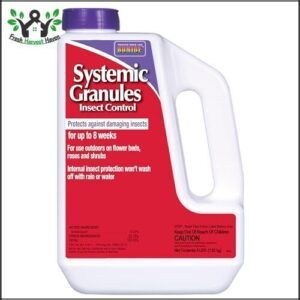
Bonide Systemic Insect Control Granules deliver proven rose care through soil-applied protection. This systemic insecticide uses Imidacloprid to shield your plants from aphids, whiteflies, Japanese beetles, and over 25 insect pests for six to eight weeks.
You’ll apply two ounces of granules per rose bush, work them into the top soil layer, and water thoroughly. The formula moves through roots to protect all plant parts, including new growth.
While effective across a broad pest spectrum, note Imidacloprid concerns regarding aquatic toxicity and shipping restrictions in certain states. Always wear gloves during granule application and follow safety guidelines carefully.
Best For: Gardeners protecting outdoor ornamental plants and roses from persistent insect infestations who need long-lasting, rain-resistant pest control.
- Provides 6-8 weeks of protection against over 25 insect pests including aphids, whiteflies, Japanese beetles, and scale through systemic action that won’t wash off
- Easy application—just sprinkle granules on soil, water in, and the formula moves through roots to protect all plant parts including new growth
- Ready-to-use granules require no mixing, with one 16-ounce container treating multiple rose bushes or shrubs at 2 oz per plant
- Not approved for edible plants, herbs, vegetables, or fruit-bearing species—strictly for ornamental use only
- Cannot be applied near water features due to aquatic toxicity concerns, and shipping restrictions apply in several U.S. states
- Contains Imidacloprid, which raises environmental concerns and requires careful handling with gloves to minimize skin exposure
2. PyGanic Gardening Pyrethrin Concentrate Insecticide
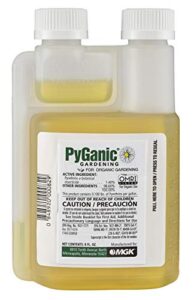
PyGanic Gardening Botanical Insecticide Pyrethrin Concentrate offers fast-acting organic rose pest control through botanically-derived pyrethrins from chrysanthemum flowers. The botanical source meets OMRI organic suitability standards and works throughout the growing season.
You’ll achieve PyGanic efficacy against aphids, whiteflies, and mites by mixing this concentrate with water and applying direct contact spray coverage. However, pyrethrin-based insecticides show short residual protection, requiring frequent reapplication methods.
Watch for pyrethrin resistance in heavily-treated areas and rinse delicate foliage to prevent leaf burn during rose pest control applications.
Best For: Home gardeners who want fast-acting organic pest control for roses and don’t mind reapplying every few days to keep aphids, whiteflies, and mites in check.
- OMRI-listed botanical formula safe for organic gardens and works on 200 insect species with no harvest waiting period
- Kills common rose pests like aphids and whiteflies on contact when sprayed directly on insects
- Breaks down quickly in sunlight, leaving no harsh chemical residue on plants or soil
- Short-lived effectiveness means you’ll need to spray every 3-5 days during heavy infestations
- Small 8oz bottle runs out fast if you’re treating multiple rose bushes or large garden areas
- Can burn delicate rose leaves if concentration is too strong or not rinsed off properly in hot weather
3. Sevin Concentrate Bug Killer Quart
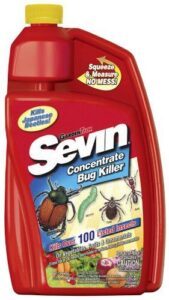
Sevin Concentrate Bug Killer offers broad-spectrum insecticide application for rose pest control with carbaryl as its active ingredient. You’ll find Sevin effectiveness against Japanese beetles and over 100 insect species through its concentrated formula that mixes easily with water.
The squeeze-and-measure design simplifies application methods on vegetables, fruit, and ornamental roses. However, safety precautions require careful attention since you can’t exceed 1.5 fl. oz. per gallon or apply weekly treatments.
Environmental concerns include keeping spray away from pets and pollinators during rose pest control operations.
Best For: Gardeners dealing with heavy Japanese beetle infestations or multiple insect problems on roses who need a powerful, versatile concentrate they can mix as needed.
- Targets over 100 insect species including Japanese beetles, making it effective for rose gardens with multiple pest issues
- Concentrated formula with squeeze-and-measure bottle allows you to mix only what you need and adjust strength for different situations
- Works on vegetables, fruits, and ornamentals, so one product covers your entire garden beyond just roses
- Weekly application limit and strict mixing ratios (max 1.5 fl. oz. per gallon) mean you can’t treat severe infestations aggressively
- Can’t be used near pets or where spray might drift toward people, limiting application timing and location
- Contains carbaryl, which raises environmental concerns especially around pollinators that benefit rose gardens
4. Ortho Bug B Gon Concentrate
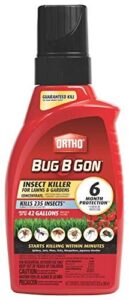
Ortho Bug B Gon Concentrate delivers systemic insecticide protection through acetamiprid active ingredients that control 235 insect species on roses. You’ll target Japanese beetles, aphids, and mosquitoes with application methods requiring simple dilution in tank sprayers or Ortho Dial N’ Spray systems.
The formula provides six-month spider control while making 42 gallons of treatment. Safety precautions include avoiding blooms to protect pollinators and keeping spray from aquatic areas.
Environmental impact concerns center on fish toxicity and beneficial insect exposure during rose pest management operations.
Best For: Gardeners looking to protect roses and other ornamentals from a wide range of common pests while providing long-lasting protection.
- Controls 235 different insect species including Japanese beetles, aphids, and mosquitoes with up to 6-month protection for spiders
- Makes 42 gallons of treatment, offering good value and coverage for larger gardens
- Easy to apply using standard dilution methods with tank sprayers or Ortho Dial N’ Spray systems
- Toxic to aquatic life, so you need to be careful around fish ponds, streams, and water features
- Can harm beneficial insects like bees and butterflies if sprayed directly on blooms during flowering
- Toxic to pets if ingested or exposed to treated areas, requiring careful application and safety precautions around your home
5. Monterey Horticultural Oil Organic Insecticide
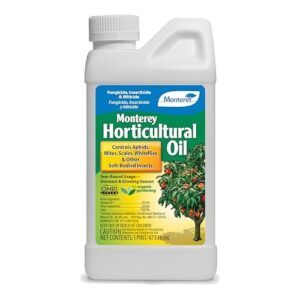
Monterey Horticultural Oil offers an OMRI-listed organic solution that suffocates soft-bodied rose pests like aphids, spider mites, and whiteflies through a physical mode of action. This 80% mineral oil formulation works during dormant and growing seasons without creating insect resistance.
Mix 2 tablespoons per gallon of water and apply every 7–14 days, covering leaf undersides thoroughly. Apply below 85°F to prevent leaf burn. It also suppresses powdery mildew and rust while remaining safe for pollinators and edible crops.
Store sealed in cool, dry conditions. Priced from $11.99 to $34.49, it’s available in concentrate and ready-to-use forms.
Best For: Gardeners looking for an organic, chemical-free way to protect roses and ornamental plants from soft-bodied pests without creating insect resistance.
- OMRI-listed and safe for organic gardening, edible crops, and beneficial insects like pollinators
- Physical mode of action (suffocation) means pests can’t develop resistance, so it stays effective long-term
- Works year-round during dormant and growing seasons while also suppressing fungal diseases like powdery mildew
- Not effective against caterpillars, worms, or heavily armored scale insects
- Requires repeat applications every 7–14 days and careful coverage of leaf undersides to work properly
- Must be applied below 85°F to avoid leaf damage, which limits when you can use it during hot weather
6. Acephate Insect Fire Ant Killer
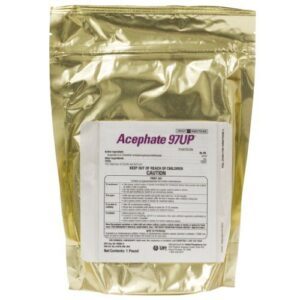
When you’re fighting a broad spectrum of rose pests, Acephate 97 Up Generic Orthene Insecticide delivers systemic and contact control with serious stopping power. This water-soluble concentrate contains 97% acephate, targeting aphids, beetles, thrips, whiteflies, and over 125 other insects through ingestion and nervous system disruption.
Mix with water and spray every 2 weeks for preventative protection. The major trade-off: it carries a strong, unpleasant smell that limits use near homes. Acephate also risks toxicity to certain plants like morning glory, so test on a small area first.
For rose-specific alternatives without the odor problem, consider organic options like neem oil or insecticidal soap.
Best For: Gardeners dealing with multiple rose pests who don’t mind a strong chemical smell and are comfortable handling potent insecticides.
- Delivers both contact and systemic control, hitting 125 insect species including aphids, beetles, thrips, and whiteflies
- Works fast through ingestion and nervous system disruption for reliable pest knockdown
- Water-soluble formula mixes easily and covers large rose gardens efficiently
- Strong, unpleasant odor limits use near homes and living areas, often requiring re-packaging
- Risks toxicity to certain plants like morning glory, so spot-testing is essential before full application
- Higher cost makes it less practical for general pest control compared to organic alternatives
7. Bonide Rose Rx Organic Garden Solution
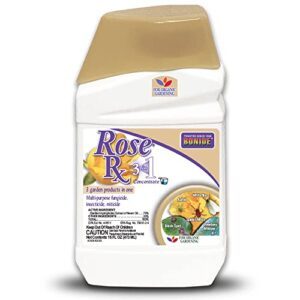
If you want an all-in-one rose protector, Bonide Rose Rx combines three critical functions in one spray. This USDA-approved organic solution contains neem oil and addresses aphids, spider mites, whiteflies, black spot, and powdery mildew across all insect life stages.
You’ll appreciate the flexible application methods—sprinkler can, hand sprayer, or low-pressure sprayer work equally well indoors or outdoors. The 16-ounce bottle offers cost savings compared to premixed alternatives, though the strong smell limits use near living spaces.
Multiple applications may be needed for stubborn infestations, and some gardeners prefer buying neem oil separately for better value.
Best For: Gardeners looking for an all-in-one organic solution to protect roses and other plants from multiple pests and fungal diseases without harsh chemicals.
- Tackles three problems in one spray—insects, mites, and fungal diseases like black spot and powdery mildew
- USDA-approved organic formula made from neem oil, safe for indoor and outdoor use around people and pets
- Works with multiple application methods and costs less than premixed alternatives
- Has a strong, unpleasant smell that limits where you can use it comfortably
- Requires repeated applications for stubborn infestations, which adds up over time
- Some users find it more economical to buy neem oil separately and dilute it themselves
8. Natural Guard Spinosad Insect Killer
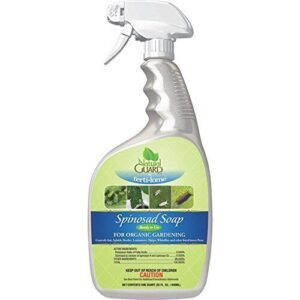
Natural Guard Spinosad Insect Killer offers a fast-acting organic solution for roses with minimal environmental impact. This OMRI-certified product contains 0.5% spinosad, which kills chewing insects like thrips, bagworms, and tent caterpillars by disrupting their nervous system.
Pests show paralysis within minutes, though full effectiveness peaks at 72 hours post-application. The ready-to-spray 32-ounce formula requires no mixing.
While spinosad breaks down quickly in sunlight and poses low toxicity to humans, it can affect beneficial insects like pollinators. Rotate this product with other insecticide groups to prevent resistance development in pest populations.
Best For: Organic gardeners and rose enthusiasts who want fast-acting pest control without harsh chemicals.
- Fast-acting formula that paralyzes insects within minutes, with peak effectiveness at 72 hours post-application
- OMRI-certified for organic gardening, breaks down quickly in sunlight, and poses low toxicity to humans and mammals
- Ready-to-spray 32-ounce format requires no mixing, making application convenient and straightforward
- Can harm beneficial insects like pollinators and natural predators, requiring careful application timing and placement
- Less effective against sucking insects and mites; may need reapplication after rain to maintain protection
- Spinosad resistance can develop with frequent use, necessitating rotation with other insecticide groups to prevent resistant pest populations
9. Natria Insecticidal Soap Garden Bug Treatment
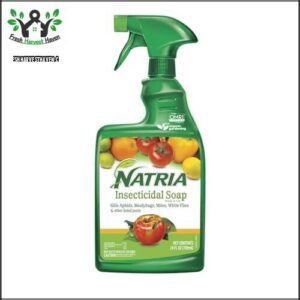
If soft-bodied pests like aphids and spider mites are draining the life from your roses, Natria Insecticidal Soap offers a gentle yet effective organic solution. The active ingredient—potassium salts of fatty acids at 1%—disrupts pest cell membranes on contact, delivering visible results within minutes.
This ready-to-use spray works across the entire pest spectrum of soft insects, including whiteflies, mealybugs, and thrips. You can apply it every 7 to 10 days for ongoing pest control without harming beneficial pollinators when used correctly.
Its rapid environmental breakdown minimizes ecological impact, making it ideal for organic gardening practices and safe for use up to harvest day.
Best For: Organic gardeners and home growers looking for a safe, fast-acting solution against soft-bodied pests like aphids, mealybugs, and spider mites on roses, vegetables, and houseplants.
- Works fast—knocks down pests within minutes of contact and can be used up to harvest day with no harmful residue
- Safe for humans, pets, and pollinators when used correctly, plus it’s approved for organic gardening
- Ready-to-use spray bottle makes application easy without any mixing or dilution
- Only effective against soft-bodied insects, so it won’t handle hard-shelled beetles or other tougher pests
- Requires reapplication every 7-10 days and thorough coverage (especially leaf undersides) to stay effective
- Some users report spray nozzle clogging and inconsistent results depending on pest type and conditions
10. Garden Safe Insect Killer Spray
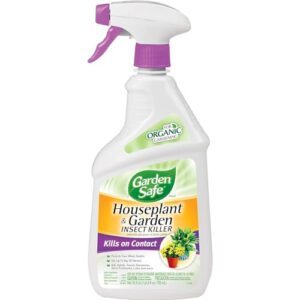
Garden Safe Insect Killer Spray combines potassium salts of fatty acids with organic certification for rose care without synthetic chemicals. Its EPA registration (67702-35-8845) confirms compliance with safe insecticide practices, though aquatic toxicity requires careful use near water features.
You’ll target aphids, mealybugs, thrips, and other garden pests through direct contact application. Application safety demands avoiding blooming periods to protect pollinators and maintaining temperatures below 90°F.
This ready-to-use formula simplifies insecticide selection for organic rose gardeners seeking immediate pest knockdown on edibles and ornamentals alike.
Best For: Organic gardeners managing soft-bodied pests on roses, vegetables, and ornamentals who need a spray safe for use up to harvest day.
- Works on contact to kill aphids, mites, mealybugs, and other common pests across all life stages including eggs
- Safe for edibles with organic certification and can be applied right up to harvest day
- Ready-to-use formula derived from chrysanthemum flowers requires no mixing
- Requires direct contact with pests and offers no residual protection, meaning you’ll need repeat applications every 3-10 days
- Highly toxic to aquatic life and bees if applied during bloom or near water features
- Spray bottle quality issues reported by users, including large droplets and potential leaking
How to Identify Common Rose Pests and Diseases
You can’t protect your roses without knowing what you’re up against. Early identification of pests and diseases makes treatment faster and more effective.
Here’s what to watch for in your rose garden throughout the growing season.
Aphids and Whiteflies
Spotting aphids and whiteflies early keeps your roses healthy. Aphids are small, soft-bodied insects that cluster on new growth and buds. They feed on plant sap and leave behind sticky honeydew. Whiteflies are tiny winged insects that flutter when disturbed and feed on leaf undersides.
- Aphid identification: Look for green, black, or pink pear-shaped insects in colonies on tender shoots
- Whitefly lifecycle: Adults lay eggs on leaf undersides that hatch into scale-like nymphs before becoming flying adults
- Rose damage: Both pests cause yellowing leaves, stunted growth, and distorted blooms through their sap-feeding
Natural predators like ladybugs and lacewings help control these pests. One simple method is to squash the aphids directly on the plant. Treatment options include insecticidal soap, neem oil, or systemic insecticides for severe infestations.
Controlling rose pests starts with regular monitoring of your plants.
Japanese Beetles and Rose Curculios
Japanese beetles and rose curculios take pest damage to another level by eating leaves down to lacy skeletons and destroying flower buds before they even open.
Japanese beetles have metallic green bodies with copper wings and feed in groups during summer months. Rose curculios are smaller weevils that drill into buds.
You can hand-pick beetles early morning or use trapping solutions and insecticides for heavy infestations.
Thrips and Other Insect Pests
Thrips are nearly invisible troublemakers that rasp at rose buds and leaves, leaving behind silver streaks and deformed flowers that never quite open right. These tiny pests multiply fast in warm weather. Look for stippled petals and distorted growth as telltale infestation symptoms.
Spider mites and scale insects also attack roses by sucking plant sap. Natural predators like minute pirate bugs help control thrips populations before you need stronger insecticides for roses.
Black Spot, Powdery Mildew, and Fungal Diseases
Fungal diseases hit roses harder than most pests. Black spot appears as dark circular lesions surrounded by yellowing tissue and causes up to 90% leaf loss in humid climates. Powdery mildew forms whitish patches on young growth under warm, humid conditions between 20–25°C. Both diseases share three key warning signs:
- Early leaf discoloration progressing from lower branches upward
- Premature defoliation reducing bloom production by half
- Stem lesions indicating late-stage infection requiring fungicide treatment immediately
Environmental factors like poor air circulation and overwintering spores in debris fuel recurring outbreaks. To combat this, consider using Seican for biocontrol.
Choosing Between Organic and Chemical Insecticides
You have two main paths when protecting your roses from pests: organic options that work with nature or chemical solutions that deliver faster results. Each approach has trade-offs in effectiveness, speed, safety, and environmental impact.
Here’s what you need to know about organic controls, chemical insecticides, systemic versus contact options, and all-in-one solutions.
Benefits of Organic Pest Control
Organic pest control offers you a safer path forward—one that protects your roses without leaving harsh chemical residues on the plants you touch or in the soil where beneficial organisms live.
These eco-friendly solutions promote soil health and pollinator protection while reducing toxicity in your garden.
Natural remedies like neem oil provide long-term benefits by targeting pests without disrupting beneficial insects that keep your roses thriving naturally.
Pros and Cons of Chemical Insecticides
Chemical insecticides deliver fast results, usually reducing pest populations by 70% to 95% within two application cycles. However, resistance development appears in roughly 42% of aphid and thrips populations over five years of managed use.
These pesticides carry environmental toxicity risks, with residues averaging 13.56 active substances per rose sample. Human health concerns include dermal exposure to compounds that affect your nervous system.
Cost analysis shows insecticides account for up to 15% of production expenses, with resistance management pushing costs higher.
Systemic Vs. Contact Insecticides
When choosing systemic insecticides versus contact insecticides for roses, understanding their distinct mechanisms helps you match the right product to your pest challenge. Here’s how they compare:
- Pest Specificity: Systemic insecticides excel against piercing-sucking pests like aphids and thrips that feed on plant tissues, while contact insecticides work on both chewing and sucking insects when sprayed directly.
- Residual Effects: Systemic products provide 2 to 12 weeks of protection as they move through plant tissues, whereas contact insecticides degrade within days and need reapplication every 5 to 7 days.
- Application Timing: Soil-drench systemic treatments offer up to 30 days of defense and reach hidden pests inside buds, but contact sprays deliver immediate knockdown of visible infestations.
- Environmental Safety: Contact insecticides pose localized risks to beneficial insects, while systemic neonicotinoids persist in nectar and pollen for weeks, threatening pollinators and increasing resistance risks in pest populations.
All-in-One Insecticide Solutions
All-in-one insecticide solutions combine multiple active ingredients to tackle insects, fungal diseases, and mites in a single spray, simplifying your rose care routine when pests and diseases overlap. Products like BioAdvanced All-in-One Rose Care and Rose Rx 3 in 1 Concentrate reduce application time and cost compared to buying separate treatments.
However, these combo products can accelerate resistance issues when you apply broad-spectrum controls unnecessarily, and they raise environmental concerns by exposing beneficial insects to multiple active ingredients simultaneously.
Tips for Effective Insecticide Application on Roses
Applying insecticide correctly makes the difference between healthy roses and ongoing pest problems. The timing of your treatments and how you approach pest management directly affect your results. Here’s what you need to know to protect your roses effectively.
Proper Timing and Frequency
Timing your insecticide applications can mean the difference between thriving roses and a losing battle against persistent pests. Seasonal application windows matter because insects and diseases emerge at specific growth stages. Here’s your timing framework:
- Early spring: Apply when new foliage appears to prevent aphids and black spot
- Mid-summer: Target Japanese beetles and fungal spores during peak heat
- Fall: Treat for overwintering pests before dormancy
Weather impacts effectiveness—avoid applying before rain or during extreme heat. Reapplication periods generally run every 7-14 days depending on the product and pest pressure. Integrated Pest Management emphasizes proper insecticide application methods aligned with your roses’ natural cycles.
Preventative Vs. Reactive Treatments
Think of pest control like home maintenance—you can either patch the roof after water damage or weatherproof it before the first storm. Preventative insecticide use through Integrated Pest Management (IPM) builds long-term control and plant health. Early detection combined with scheduled treatments prevents resistance management issues, while maintaining healthy rose gardens focuses on rose disease prevention before visible damage occurs.
| Approach | Preventative | Reactive |
|---|---|---|
| Timing | Before pests appear | After infestation detected |
| Cost | Lower long-term expenses | Higher immediate costs |
| Effectiveness | Sustained plant health | Quick knockdown but potential recurrence |
| Application | Regular insecticide application methods | Targeted intensive treatments |
Combining Pest and Disease Management
Managing pests and diseases together saves time and amplifies your results because many rose problems show up at the same time and respond to combo products. A comprehensive approach targeting rose diseases and pests simultaneously strengthens long-term health while preventing resistance management issues.
Effective combination strategies:
- Apply all-in-one insecticide solutions like Rose Rx 3 in 1 Concentrate for fungal disease prevention and insect control
- Use BioAdvanced All-in-One Rose Care during peak vulnerability periods
- Rotate treatments to avoid pest adaptation
- Match seasonal strategies to local pest cycles
- Monitor plant response weekly to adjust applications
Safety and Environmental Considerations in Rose Pest Control
Using pesticides responsibly protects your roses and the environment around them. You need to understand proper application methods and ways to minimize harm to beneficial insects.
Let’s look at the key safety measures and environmental practices that keep your garden healthy for years to come.
Safe Handling and Storage of Insecticides
Before you apply any insecticide to your roses, you need to understand how to use these products safely to protect yourself and everyone around you. Always wear protective gear, including gloves and long sleeves, to minimize pesticide toxicity risks. Ensure proper ventilation when mixing or applying products. Store insecticides in their original containers in locked cabinets away from children and pets for child safety. Follow label instructions for proper disposal and know basic first aid procedures.
| Safety Measure | Key Action |
|---|---|
| PPE Importance | Wear gloves, long sleeves, eye protection, and mask during application |
| Ventilation Needs | Mix and apply outdoors or in well-ventilated spaces to avoid inhalation |
| Child Safety | Lock insecticides in high cabinets away from kids and pets |
| Proper Disposal | Follow label instructions and local regulations for container disposal |
| First Aid | Keep emergency numbers handy and rinse skin immediately if exposed |
Protecting Beneficial Insects and Pollinators
Your choice of insecticides affects more than just pests. Bees and other pollinating insects visit roses for nectar, making application timing critical for their safety. Organic gardening methods paired with IPM strategies reduce harm to beneficial insects while controlling aphids and beetles. Systemic effects from certain products persist in soil and flowers, so habitat enhancement and environmental considerations matter when protecting pollinators.
- Apply treatments before bloom periods to shield foraging bees from exposure
- Choose low-toxicity options like horticultural oils that spare natural predators
- Monitor pollinator activity and coordinate with neighbors to minimize risk
Personal Protective Equipment and Application Safety
Using insecticides safely begins with the right gear to protect you from the chemicals you’re applying to your roses. Personal protective equipment (PPE) is essential during pesticide application—gloves prevent skin absorption, while goggles shield your eyes from drift. The importance of ventilation cannot be overstated when mixing concentrates indoors. Always follow the mixing guidelines on each label for proper dilution ratios and safe disposal methods.
| Safety Consideration | Equipment Needed | Why It Matters |
|---|---|---|
| Skin Protection | Chemical-resistant gloves, long sleeves | Prevents absorption and irritation |
| Respiratory Safety | Mask or respirator | Blocks inhalation of spray particles |
| Eye Safety | Goggles or face shield | Guards against splashes during mixing |
Keep first aid supplies nearby and rinse immediately if contact occurs. Integrated Pest Management (IPM) paired with insecticide safety practices reduces your exposure while maintaining rose health through smart pesticide application techniques.
Environmental Impact and Organic Gardening Practices
When you choose conventional insecticides for your rose garden, you’re participating in a wider environmental picture that includes pesticide runoff into waterways and a larger carbon footprint from production and transport. Organic gardening practices offer a different path forward with natural remedies that reduce both biodiversity effects and water contamination risks.
- Pesticide Runoff: Chemical treatments can leach into local water sources, harming aquatic ecosystems and beneficial soil organisms
- Biopesticide Efficacy: Organic insecticides like neem oil and spinosad control pests effectively while breaking down faster in the environment
- Water Conservation: Organic methods using compost improve soil moisture retention, reducing irrigation needs in your rose beds
- Carbon Footprint: Choosing locally sourced organic products minimizes transportation emissions compared to synthetic alternatives shipped long distances
Frequently Asked Questions (FAQs)
Which insecticide is best for Roses?
No single insecticide works for every situation. Your choice depends on the pests you’re facing and how quickly you need results.
Systemic insecticides provide long-lasting protection, while organic options like pyrethrin offer fast-acting control with safer application around pollinators.
How do I get rid of pests on my Roses?
To get rid of pests on your roses, start by identifying the specific pest. Then select appropriate treatment options like insecticidal soap for soft-bodied insects or systemic insecticides for long-term control. Apply treatments using proper methods and timing for effective rose care.
How much insecticide do you use on roses?
The amount depends on your product’s label instructions and your rose’s size. Most insecticide sprays require dilution rates of 1-2 tablespoons per gallon of water. Apply enough to cover all leaf surfaces thoroughly without runoff, adjusting frequency based on pest pressure.
Are insecticides safe for indoor Roses?
Indoor roses need careful insecticide selection because ventilation needs and pet exposure matter more than outdoors. Insecticidal soap and neem oil offer safer alternative controls with lower indoor toxicity.
Prioritize child safety by storing products securely and applying treatments when spaces are unoccupied.
Are roses pest-free?
No rose bushes are completely pest-free. Rose vulnerability to insect infestation varies by rose varieties and their natural defenses, but all roses need ongoing care and pest control to stay healthy.
Do chemical pesticides kill Rose Bush?
Properly prescribed pesticides won’t permanently poison your rose bushes. However, chemical overuse effects like leaf burn and root damage can occur when you apply too much.
Rose bush resilience depends on following label rates. Long-term damage happens from repeated misuse, not occasional treatments.
Alternative solutions include organic insecticide safety methods.
When should I start treating rose pests?
Early detection is your best defense against pest and disease damage. Start inspecting rose bushes weekly in spring when growth stages accelerate and temperatures rise.
Weather impact matters—warm, humid conditions trigger fungal diseases and insect activity, so preventative schedules work better than reactive treatments.
Can I make homemade rose pest control?
You can create effective DIY insecticide recipes using household ingredients. Mix insecticidal soap with water to control aphids and soft-bodied pests.
Neem oil solutions work well for organic gardening.
Try garlic pest repellent or baking soda remedy for natural remedies against common rose problems.
How do weather conditions affect insecticide effectiveness?
Weather works like a wildcard when you’re protecting your roses. Temperature effects can boost or slow chemical breakdown. Sunlight degradation breaks down active ingredients faster.
Rainfall impact washes away contact insecticides before they work. Wind dispersal reduces coverage and wastes product.
Humidity influence helps products stick but may encourage fungal pests.
What are signs of insecticide resistance in pests?
You’ll notice Reduced Efficacy when usual insecticide dosages no longer control pests effectively. Populations bounce back faster, requiring Increased Dosage or more frequent applications.
Watch for Behavioral Changes like pests avoiding treated areas or Faster Reproduction cycles.
Cross-Resistance may develop, making multiple pesticide classes ineffective simultaneously.
Conclusion
Your roses face an arsenal of pests that can devastate a garden overnight. Armed with the best pest control for roses that matches your growing style and pest pressure, you’ll protect those blooms before damage occurs.
Whether you choose organic concentrates that work on contact or systemic granules that defend for months, consistent application beats reactive panic every time.
Your roses depend on prevention, not hope. Start treating them like the living investment they are.
- https://www.cdc.gov/biomonitoring/Acephate_BiomonitoringSummary.html
- https://aggie-horticulture.tamu.edu/newsletters/hortupdate/hortupdate_archives/2004/mar04/Spinosad.html
- https://homeguides.sfgate.com/pesticide-spray-roses-45223.html
- https://www.thespruce.com/whats-wrong-with-my-roses-1402961
- https://www.youtube.com/watch?v=kDJhBnaOCj4






